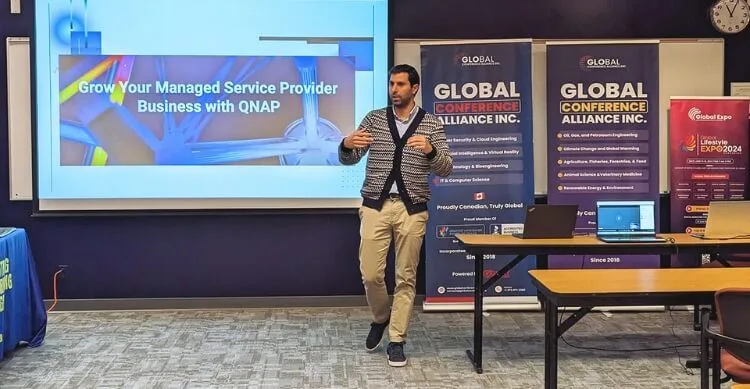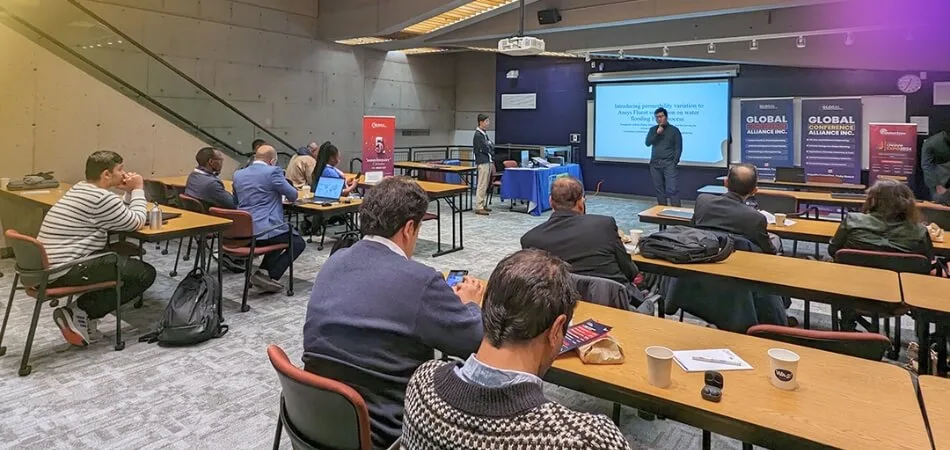A conference is a gathering where professionals come together to share knowledge, network, and gain insights into their industry. Taking part in these events can be crucial for career development, providing a platform to learn and grow. However, when it comes to the costs involved, what expense category is a conference?
Conference costs often fall under Professional Development or Training and Education when the main purpose is learning. Attendance for promotion, sponsorship, or running a booth usually fits better under Marketing, Advertising, or Trade Show expenses.
Conference spending is also usually made up of more than one item. It can include registration fees, travel, accommodation, meals, and local transport. Knowing how to categorize each part helps you budget better. In the rest of this article, we’ll break down the best categories for each common conference cost and explain the key rules to watch for.
The Core Purpose of Attending a Conference
Conferences can have different purposes, and that purpose is what decides the best expense category. Some people attend mainly to learn, join workshops, and improve skills related to their work, so the registration fee usually fits under Training and Education or Professional Development. Others attend mainly to promote a business, meet clients, sponsor the event, or run a booth, so those costs usually fit better under Marketing, Advertising, or Trade Show expenses.
This applies to many events, including conferences in Canada, the USA, or other regions, where attendees often claim the ticket as a learning expense while sponsors and exhibitors record their costs under marketing. Sometimes the purpose is mixed, and in that case, it is best to split the costs by type, such as the ticket, travel, hotel, meals, booth rental, and sponsorship fees. This keeps your records clear and makes reporting easier later.
Moreover, conferences often serve as a launching pad for new projects or initiatives. They provide a space for brainstorming and refining ideas. In the end, attendees leave with actionable takeaways that can be put into practice in their work. So, it is clear that the impact of these events extends beyond the event itself, influencing future decisions and strategies.
What Makes Conference Good?
A good conference is essential for maximizing the benefits of professional gatherings and making meaningful interactions. Here’s what makes a conference good:
- Relevant Content: A good conference offers insightful sessions and workshops tailored to the attendees’ interests and needs.
- Engaging Speakers: Compelling speakers who are experts in their fields captivate audiences, delivering valuable insights and inspiration.
- Interactive Sessions: Opportunities for interactive discussions, Q&A sessions, and hands-on workshops enhance attendee engagement and learning.
- Networking Opportunities: Well-planned networking sessions enable attendees to connect with peers, collaborators, and industry leaders.
- Diversity and Inclusion: A diverse lineup of speakers and inclusive programming ensures that different perspectives are represented and valued.
- Post-Conference Support: Continued access to resources, follow-up sessions, and online communities sustain the conference’s impact beyond its duration.
In essence, an outstanding conference is more than simply a gathering; it’s an enlightening experience that propels career advancement and cultivates lasting connections.
What Expense Category is a Conference?
A conference does not always fit into one single expense category. The right category depends on the main purpose of attending and the type of costs involved. Below is an explanation of how conference expenses are usually divided into specific categories to aid in financial planning:
Professional Development Expenses
Conferences are primarily categorized as professional development expenses. This category includes not only the registration fees but also the essential costs of travel and accommodations. These expenses are investments in developing professional skills and industry knowledge. Analyzing these costs properly can help organizations track the growth of their employees.
Costs placed here usually include the conference registration fee and learning related sessions. Travel, accommodation, and meals are better recorded under their own expense categories, especially for out-of-town events, so each cost is tracked clearly and accurately in your records.
Training and Education Costs
Training and education costs apply when the conference includes workshops, classes, or certification sessions with clear learning outcomes. This category is useful when the educational value is the main value of attending.
Costs here may include workshop fees, study materials, and certification exams. Grouping these learning items together helps you review education spending without mixing it into hotel, flights, or transport.
Marketing and Advertising Expenses
Marketing and advertising fit when the conference is used for promotion, lead generation, or sales activity. This is common for sponsors, exhibitors, and businesses attending mainly to grow contacts or customers.
Costs recorded here often include sponsorship packages, paid ads in event materials, banners, flyers, and branded giveaways. Keeping these under marketing makes the purpose clear and helps compare event promotion spending over time.
Tax Deductibility of Conference Expenses
Conference expenses are not always fully deductible. The tax treatment depends on the type of cost and where your business is based. The notes below cover the most common situations for Canada and the United States.
Canada (CRA)
For self-employed individuals, CRA generally allows deductions for attending up to two conventions per year, as long as the convention meets CRA conditions and relates to the business. Conference registration fees may qualify when those conditions are met.
Food, beverages, and entertainment expenses are generally limited to 50% of the eligible amount, with some exceptions. Travel and accommodation can be claimed when the trip is business-related, as long as you keep proper records.
United States (IRS)
In the United States, conference and travel costs must be ordinary and necessary for business activities. Registration fees, airfare, and lodging are commonly allowed when the event has a clear business purpose, and you keep supporting documents.
Meals are usually limited to 50% of the cost, while entertainment expenses are generally not deductible for most situations. Keeping clear receipts and brief notes about the business purpose helps support the claim.
Conference Expense Categories
Many people want to know which line item to pick in tools like QuickBooks or Xero. The table below shows the most common way businesses record conference costs. Account names may vary, but the idea stays the same.
| Conference cost | Typical expense category |
| Conference registration fee | Training & Education (or Professional Development) |
| Workshops or learning sessions | Training & Education |
| Flight or train | Travel Expense |
| Hotel or accommodation | Travel Expense |
| Booth rental | Marketing / Advertising (or Trade Show) |
| Sponsorship fee | Marketing / Advertising |
| Client dinner | Meals & Entertainment (often 50% limited) |
| Local transport or parking | Travel Expense |
How to Utilize the Conference Expenses Effectively?
Conference costs can add up quickly, so it helps to handle them in a smart and organized way. The goal is to get the most value from what you paid and keep your expenses easy to track for reimbursement or tax time. Here’s how you can utilize conference expenses effectively:
Here is a simple process of how to utilize the conference expenses effectively:
Plan Your Budget Before You Book
Start by listing the main costs you may have to pay, such as the ticket, travel, hotel, meals, and local transport. If you set a spending limit for each part, it becomes easier to avoid overspending later.
Book Early to Save Money
Conference tickets, flights, and hotels are often cheaper when you book early. Early booking also gives you more choices, so you can pick options that match your budget instead of paying extra at the last moment.
Track Each Expense Separately
Do not treat the conference as a single cost. Keep the ticket, travel, hotel, meals, and local transport separated. This makes your expense report clearer and helps you understand where most of your money went.
Keep Receipts and Proof of Payment
Save your registration invoice, flight or train tickets, hotel bills, and itemized meal receipts. If you use digital payments, keep screenshots or email confirmations as backup. These documents help a lot when claiming reimbursements or reporting expenses.
Use One Method for Payments
If possible, pay conference costs using one card or one payment method. This makes it easier to track spending, find transactions, and match payments with receipts.
Review Your Spending After the Conference
After the event, check your total spending and compare it with your budget. Note what costs more than expected and what you can improve next time. This helps you plan better for your next conference and spend more wisely.
Essential Tips for Tracking Conference-Related Expenses
Maintaining an effective record of conference-related expenses ensures that you stay within budget and maximize the value of your investment. Proper expense management requires attention to detail and organized record-keeping. Listed below are essential tips for tracking your conference spending:
- Use an Expense Tracking App: Utilize an expense tracking app to log every transaction during the conference. This method helps you monitor and manage spending easily.
- Keep All Receipts Organized: Collect and organize all physical and digital receipts in one place. This practice ensures accurate records for reimbursements and reports.
- Categorize Expenses by Type: Divide your expenses into categories like travel, meals, and accommodation. This organization simplifies tracking and highlights fixed conference expenses clearly.
- Review Expenses Daily: At the end of each day, review all expenses to stay on track. Regular monitoring prevents overspending and ensures budget adherence.
- Utilize Credit Cards for Conference Payments: Use credit cards for conference-related payments to earn rewards or cashback. This strategy also simplifies expense tracking and record-keeping.
- Prepare a Post-Conference Expense Report: Compile a detailed expense report after the conference. This report will help in reimbursement processes and future budget planning.
Frequently Asked Questions about What Expense Category is a Conference?
Conference expenses can look simple at first, but the right category often depends on why you attended and what you paid for. These FAQs cover the most common questions people ask when recording conference costs in their accounts, including tickets, travel, meals, sponsorships, and bookkeeping tips.
Are Registration Fees Considered Part of Conference Expenses?
Yes. For someone attending a conference, the registration fee is an expense. It is usually recorded under Training & Education or Professional Development when the purpose is learning.
What is the Best Way to Record Meals During a Conference Trip?
Most businesses record meals under Meals and Entertainment rather than travel. Keep itemized receipts and a short note about the business purpose. Meal costs may also have deduction limits depending on your location.
How Can I Control Conference Expenses to Stay Within Budget?
Set a budget before you book by splitting costs into ticket, travel, hotel, meals, and local transport. Try to book early, choose a stay close to the venue, and set a simple daily limit for food and small spending. Track expenses each day and keep receipts so you can adjust quickly if you start going over budget.
What If the Conference Has Both Learning and Business Promotion?
When the purpose is mixed, record each cost based on what it was for. The ticket and workshops can go under Training & Education, while booth fees, sponsorship, and promotional materials usually go under Marketing or Trade Show expenses. Keeping costs separated helps avoid confusion later.
Can I Obtain Sponsorships to Offset Conference Expenses?
Yes, securing sponsorships from businesses, organizations, or individuals can help offset conference expenses by providing financial support or covering specific costs in exchange for branding opportunities and promotional benefits.
How Do I Record a Conference Refund or Cancellation Fee?
If you receive a refund, record it as a reduction of the original conference expense. If there is a cancellation fee, record that fee under the same category as the registration expense, since it is linked to the ticket.
Conclusion
Conference costs can support learning, business promotion, or both, so they do not always fit into one single category. In most cases, the registration fee is recorded under Training and Education or Professional Development when the main purpose is learning. If the purpose is promotion, sponsorship, or running a booth, those costs usually fall under Marketing, Advertising, or Trade Show expenses.
Travel, accommodation, meals, and local transport are usually recorded in their own categories, so your records stay clear. Once you understand these basics, the answer to “What Expense Category is a Conference?” becomes simple: it depends on the purpose of attendance and the type of cost you are recording.








